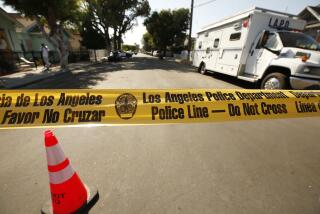From Chief to Crime Lab, LAPD Needs to Communicate
- Share via
In an unusual confluence of events, the Los Angeles Police Department is taking a top-to-bottom beating in two places in the Civic Center.
The lower levels are under assault in the Criminal Courts Building where the police crime lab is under the unforgiving spotlight of the O.J. Simpson trial.
Just to the east, at City Hall and nearby police headquarters, the man at the top, Chief Willie L. Williams, is fighting for his job, trying to survive attacks on his ethics and leadership abilities.
On the surface, the events may seem unconnected. But they have something important in common. In each case, the Police Department is subjected to the furious and critical coverage of an intensely competitive and influential media.
And in L.A., you’re dead unless you can play the media game.
*
The crime lab is coming under close scrutiny in the trial because of defense strategy. Simpson’s lawyers contend that the defendant is the victim of either a police frame-up or of incompetence by department detectives and criminalists. The crime lab is an important part of each scenario.
As a result, we’re getting the most thorough public examination so far of the Police Department’s scientific capability in a time when technology is becoming an increasingly important part of crime solving. It’s happening on live television, with commentators usually ripping department personnel.
So far, the lab hasn’t done well. Appearances on the witness stand by lab technicians have ranged from fumbling to adequate. Criminalist Dennis Fung was a fumbling witness earlier in the trial and the crime lab’s reputation wasn’t helped when he told of air conditioner failure on the lab truck carrying evidence in the Simpson case.
Criminalist Collin Yamauchi made things worse Friday when he was subjected to a tough cross-examination by defense attorney Barry Scheck.
Scheck sought to portray a department that is nowhere near the cutting edge of modern forensic science. He demanded to know whether Yamauchi had read a certain National Research Council report on DNA technology. “Maybe not cover to cover,” the criminalist replied.
Scheck also derided the Police Department’s in-house training methods. “And so I take it that there was no Ph.D. in molecular genetics or any related field who on any basis was there to assess the validation studies that you were performing during your training period?” Scheck asked, with a sneer in his voice.
“No, there was no Ph.D. there,” Yamauchi replied.
Yamauchi’s answers to these and other questions were a sharp contrast to California Department of Justice criminalists who seemed to spend their spare time attending classes and reading journals.
Of course, it’s hard for the crime lab and other Police Department scientific crime fighters to keep up with their fast changing field when the leadership at the top is, at best, shaky.
*
The shakiness of leadership was apparent Wednesday when Chief Williams strode to the rostrum at the police headquarters auditorium to defend himself after the Police Commission reprimanded him for allegedly receiving free accommodations at a Las Vegas hotel.
His poor presentation showed why he hasn’t been able to accomplish the difficult job of seizing the department’s reins to the satisfaction of Mayor Richard Riordan and his appointees on the Police Commission.
“I am not a liar,” he said in a statement delivered in the stiff manner of a formal address. But he ignored the advice of some supporters and refused to answer questions shouted by the print, television and radio reporters occupying the auditorium’s first three rows.
Rather, the chief resorted to a legalistic response to the allegation, which apparently refers to that old Las Vegas custom, the “comp,” a complimentary room or meal given to big, and even medium-sized, gamblers.
Williams replied that he has not “solicited any form of gratuity or received any complimentary benefit . . . from any hotel which is not available to the general public.”
In other words, maybe he accepted a comp, but he didn’t solicit it, and the gratuity is nothing more than what is available to any other substantial player. Police sources said it’s Williams’ wife, not him, who plays.
As far as whether he lied to the Police Commission about the freebie, Williams said it was a “misunderstanding and miscommunication or a difference about semantics.”
He sounded like a man testifying in a lawsuit rather than a police chief locked in a battle for survival that is much more political than legal.
Williams, from the tough, in-your-face politics of Philadelphia, is lost in L.A.’s tricky currents.
A couple of police executives told me that Williams is used to an atmosphere where people insult you to your face and stab you in the chest. Here, they smile, wish you a nice day and plunge a dagger in your back.
The stab is administered through complex ways--leaks, secret investigations, anonymous smears and other devices. The victim never knows who is wielding the knife.
In Philadelphia, you can fight back with a party organization, City Hall patronage, or churches, lodges or other groups in an old and compact city.
In L.A., you fight back through the media, on talk radio, on the evening TV news, in the newspapers. This is a city held together by media, not organizations.
Williams doesn’t understand that. He should have answered every question when he appeared before the press, holding forth confidently.
The chief’s weak defense on live television, his failure to take questions, not only hurt him but made it tough on the department he is expected to lead. His speech and the testimony of the police forensic specialists show that what the department needs is better communications and performance from top to bottom.
More to Read
Sign up for Essential California
The most important California stories and recommendations in your inbox every morning.
You may occasionally receive promotional content from the Los Angeles Times.










